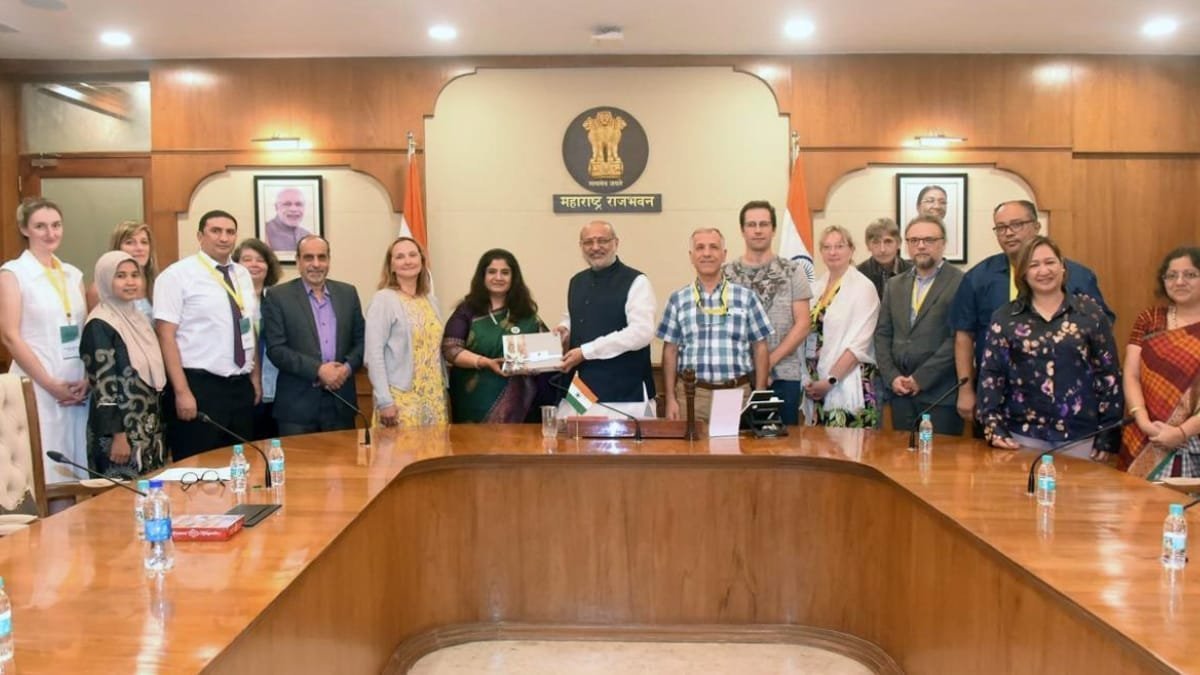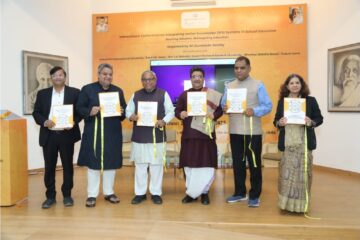Mumbai (Maharashtra), November 29: HSNC University, Mumbai, hosted the 3rd Research Co-ordination Meeting (RCM) of the International Atomic Energy Agency’s (IAEA) Coordinated Research Project (CRP) titled “Radiation Effects on Polymer Materials Commonly Used in Medical Devices” from 18th to 22nd November 2024. This meeting brought together distinguished scientists from 16 nations to advance global healthcare innovations.
Led by Col. Dr. Hemlata K. Bagla, Vice Chancellor, HSNC University, Mumbai, who represents India as the Chief Scientific Investigator and who founded the Department of Nuclear and Radiochemistry at K.C. College in 1997, the Meet underscores K C Colleges’s and HSNC University’s pivotal role in fostering international collaborations and advancing the peaceful applications of atomic energy in healthcare.
Speaking at the opening of the Meet, Dr. Bagla said “This meeting represents a gateway to deeper international collaborations. By aligning research with global standards, we are contributing to safer medical practices and advancements in radiation technology, benefiting humanity at large”.
The meeting, chaired by Dr. Valeriia Starovoitova, Scientific Secretary, IAEA, featured scientists and industry researchers from 16 countries, including Egypt, Argentina, Poland, Brazil, France, Tunisia, Portugal, Russia, Turkey, Serbia, USA and India.
Discussions centred around progress, insights and future directions in the study of radiation effects on polymers, reinforcing the global significance of this research.

The Hon’ble Governor of Maharashtra and Chancellor of HSNC University, Mumbai, Shri C.P. Radhakrishnan, graciously hosted international delegates at the Raj Bhavan on the second day of the Meet, where he emphasised India’s unwavering commitment to leveraging atomic energy for healthcare advancements. Highlighting the critical role of nuclear medicine, radiotherapy and radiation diagnostics in combating global health challenges such as cancer, he commended the efforts of Dr Hemlata K. Bagla and Dr Valeriia Starovoitova towards fostering international scientific cooperation.
“This collaboration represents a beacon of hope for global healthcare, combining expertise from around the world to develop safer and more effective medical technologies,” the Governor avered.
Speaking on the sidelines of the meeting, Dr. Bagla shared that this research initiative is part of a five-year global project (2021–2026) which investigates the effects of radiation on polymers used in medical devices, such as catheters and other critical instruments. With a focus on ensuring safety and effectiveness, the findings are poised to significantly impact public health and inform safer sterilisation techniques in the food industry. Expanding radiation sterilisation methods will have a collateral benefit aligned with UN Sustainable Development Goals.
Delegates also visited premier facilities in India, including the Tata Institute of Fundamental Research (TIFR), to observe accelerator technologies and Kokilaben Dhirubhai Ambani Hospital, where they explored advanced nuclear medicine facilities. These visits offered valuable insights into India’s robust infrastructure and its role in advancing nuclear technologies for healthcare.
In addition to the academic and research-focused activities, a cultural evening titled “Rhythms of India: Tapping the Cultural Tapestry” was organised. This vibrant showcase of India’s rich cultural heritage captivated the international delegates, offering them an immersive experience of the country’s diverse traditions and artistry.
The Meeting also provided a remarkable opportunity for HSNC University students to engage directly with international scientists and experts. Selected students actively participated in sessions held at the University Council Room, where they were exposed to cutting-edge research on radiation effects in polymers and their applications in medical devices. This invaluable interaction not only enriched their academic journey but also motivated them to explore advanced research avenues and contribute to global innovations in nuclear science and healthcare technologies.
The event received approvals from major national and international bodies, including the Department of Atomic Energy (DAE), the Atomic Energy Regulatory Board (AERB), the Ministry of Education, the Maharashtra Government, the Ministry of External Affairs and the Permanent Mission of India in Vienna. Dr. A.K. Mohanty, Secretary, DAE, also assured continued support for this critical research initiative hosted at HSNC University.
HSNC University, Mumbai, is taking significant strides in research and innovation, positioning itself as a leader in addressing global challenges. By hosting this international meeting, the University underscores its dedication to tackling real-world issues and advancing groundbreaking scientific initiatives. This Meet served as a platform for collaboration, knowledge exchange and the development of solutions that have the potential to transform various sectors. Through such initiatives, HSNC University, Mumbai, continues to contribute to the global scientific community while fostering an environment of innovation and progress.
If you have any objection to this press release content, kindly contact pr.error.rectification@gmail.com to notify us. We will respond and rectify the situation in the next 24 hours.




